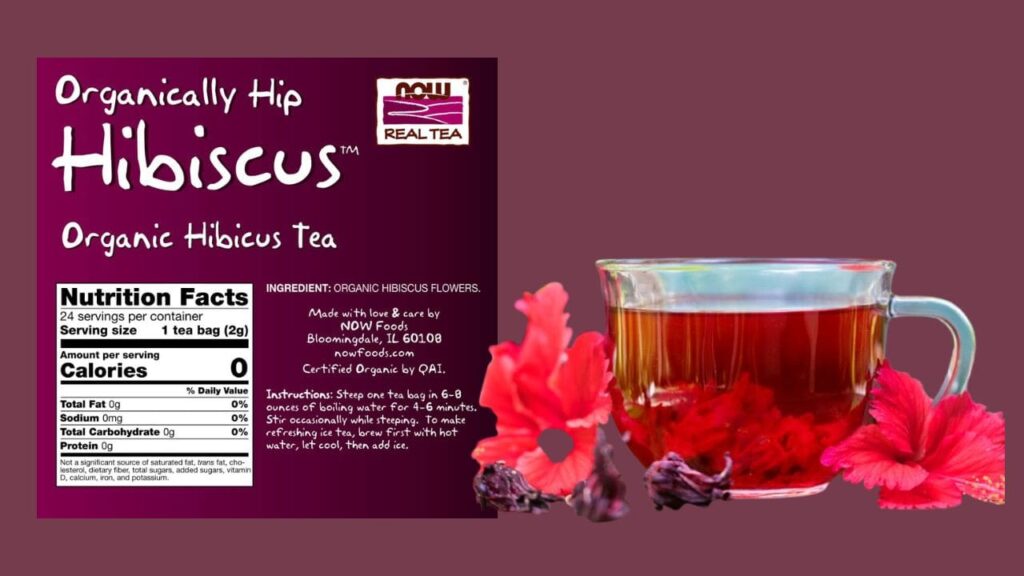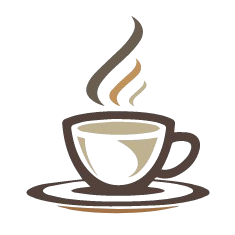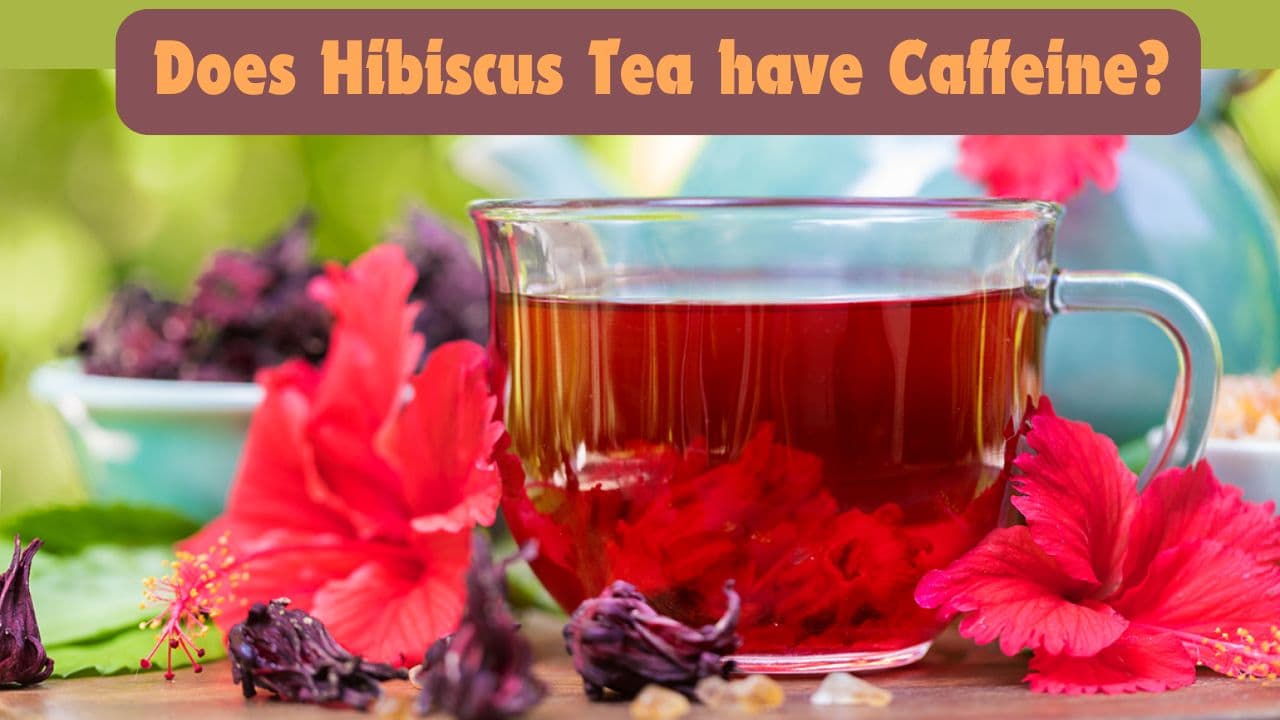Written By: Sherry Harris
Hibiscus tea has gained global popularity thanks to its vibrant color, tangy flavor, and numerous health benefits. But one question remains for tea lovers: does hibiscus tea have caffeine? Whether you’re trying to cut back on your caffeine intake or simply curious, this article explores the details of this beloved herbal beverage.
Table of Contents
What Is Hibiscus Tea
Hibiscus tea is made from the dried petals of the hibiscus flower, scientifically known as Hibiscus sabdariffa. Originating in Africa, this tea has been enjoyed for centuries, particularly in regions like Egypt and Sudan, where it’s known as “Karkadeh.” Its global reach has introduced this beverage to millions who cherish its refreshing and tart taste.
Hibiscus tea stands out for its tangy, cranberry-like flavor. Its slightly acidic taste is complemented by natural sweetness when brewed correctly. It’s a versatile beverage that pairs well with various sweeteners and spices.
Does Hibiscus Tea Contain Caffeine?
No, hibiscus tea does not contain caffeine. It is a naturally caffeine-free herbal tea, making it an excellent choice for those seeking an alternative to caffeinated drinks. Unlike traditional teas derived from the Camellia sinensis plant, hibiscus tea is made from flower petals, which naturally lack caffeine.
A beverage is considered caffeinated if it contains the compound caffeine, typically found in plants like coffee beans, tea leaves, and cocoa. These plants naturally produce caffeine as a defense mechanism against pests. Hibiscus, however, belongs to a different category of plants that do not produce this compound. As a result, hibiscus tea remains free of caffeine while still offering a refreshing and invigorating drinking experience.
Key Ingredients of Hibiscus Tea
The key ingredients of hibiscus tea are simple yet powerful, contributing to its tangy flavor and health benefits: Does Hibiscus Tea have Caffeine?
- Hibiscus Petals: The primary ingredient, rich in antioxidants and responsible for the tea’s vibrant red color.
- Water: Used to extract the nutrients and flavors from the dried petals.
- Optional Sweeteners: Honey or sugar can be added to balance its natural tartness.
- Flavor Enhancers: Spices like cinnamon or cloves, or fruits like orange slices, to add complexity to the taste.
Nutritional Facts of Hibiscus Tea
Hibiscus tea is a nutrient-rich beverage that’s naturally low in calories and free from caffeine, fats, and added sugars. It is packed with antioxidants like anthocyanins, which fight oxidative stress, and a healthy dose of vitamin C, boosting your immune system. Additionally, its diuretic properties aid in detoxification and hydration. Does Hibiscus Tea have Caffeine
| Nutritional Fact | Amount per Serving |
|---|---|
| Calories | 0-2 |
| Vitamin C | 20% of Daily Value |
| Fats | 0 g |
| Sugars | 0 g |
| Caffeine | 0 mg |
How Hibiscus Tea Compares to Caffeinated Beverages
Hibiscus Tea vs Coffee
Coffee is well-known for its high caffeine content, which provides a quick energy boost but can also lead to jitters and dependency. In contrast, hibiscus tea is naturally caffeine-free, making it a gentler choice for those seeking hydration without stimulation. Coffee is acidic and can irritate the stomach, while hibiscus tea’s mild acidity is easier on digestion. Both beverages have antioxidants, but hibiscus tea offers them without the side effects of caffeine. For a more relaxing drink, hibiscus tea is the better option.
Hibiscus Tea vs Green Tea
Green tea contains moderate levels of caffeine, offering mild stimulation along with numerous antioxidants like EGCG. Hibiscus tea, on the other hand, provides similar antioxidant benefits but is completely caffeine-free. While green tea has a grassy flavor, hibiscus tea’s tangy, fruity profile appeals to those who prefer a bolder taste. Both are excellent choices for health-conscious individuals, but hibiscus tea is ideal for those avoiding caffeine.
Hibiscus Tea vs Energy Drinks
Energy drinks are loaded with caffeine and often contain high amounts of sugar, which can lead to energy crashes. Hibiscus tea provides a natural hydration option without artificial additives or stimulants. While energy drinks are marketed for performance and endurance, hibiscus tea focuses on overall well-being and relaxation. Its antioxidants and vitamins support long-term health rather than temporary energy boosts. For a healthier alternative, hibiscus tea is unmatched.

Does Hibiscus Tea have Caffeine?
Do You Know?
👉 Does Rooibos Tea have Caffeine?
👉 Does Tazo Chai Tea Have Caffeine?
Benefits of Drinking Hibiscus Tea
Supports Heart Health
Regular consumption of hibiscus tea has been linked to lowering blood pressure and cholesterol levels. Its rich antioxidant profile combats oxidative stress, a key factor in cardiovascular diseases. Studies show that hibiscus tea can significantly reduce hypertension, especially when consumed consistently over time. It also improves circulation, helping the heart function more efficiently. This makes hibiscus tea an excellent addition to a heart-healthy lifestyle. Does Hibiscus Tea have Caffeine?
Weight Management
Hibiscus tea’s natural compounds, including polyphenols and flavonoids, help boost metabolism. These properties make it a useful tool for those looking to manage their weight when paired with a healthy diet and exercise. The tea’s low-calorie content also makes it an ideal beverage for those avoiding sugary drinks. Additionally, its diuretic effects can help reduce bloating and water weight. Enjoying hibiscus tea regularly supports overall weight management goals.
Boosts Immunity
The high vitamin C content in hibiscus tea strengthens the immune system, making it more effective in fighting off infections. Its antioxidants further protect the body by reducing inflammation and supporting cellular repair. Consuming this tea during cold and flu season can provide an extra layer of protection against seasonal illnesses. Moreover, its hydrating properties ensure that your body stays well-supported in its natural defense mechanisms. Hibiscus tea is a delicious way to bolster your immunity.
Natural Relaxation
Drinking hibiscus tea can have a calming effect on the mind and body. Its lack of caffeine means it won’t interfere with your sleep cycle, making it a great choice for evening relaxation. The warm, soothing nature of the tea can help reduce stress and anxiety. Additionally, sipping a cup of hibiscus tea is a mindful experience that encourages you to pause and unwind. Whether you’re winding down after a long day or taking a break, hibiscus tea offers tranquility.
Daily Intake of Hibiscus Tea
Moderation is key when consuming hibiscus tea. For most people, drinking 1-3 cups per day is considered safe and beneficial. This amount allows you to enjoy its health advantages, like lowering blood pressure and boosting antioxidants, without risking any adverse effects. It’s particularly important for those with specific health conditions, such as low blood pressure or pregnancy, to consult a doctor before increasing their intake.
Overconsumption of hibiscus tea, such as more than 4-5 cups daily, may lead to side effects like dizziness, upset stomach, or interactions with certain medications. By keeping your intake balanced, you can reap its health benefits while minimizing any potential risks.
Conclusion
Hibiscus tea is a caffeine-free, health-boosting beverage that’s as delicious as it is nutritious. Whether you’re sipping it for its immune-strengthening antioxidants or its ability to support heart health, it’s an excellent addition to your daily routine. Its tangy flavor and striking red hue make it a refreshing and enjoyable drink.
Remember, while hibiscus tea is safe for most people, it’s best consumed in moderation to avoid any unwanted side effects. If you’re new to it, start with one cup a day and observe how your body reacts. Over time, this vibrant tea can become a flavorful staple in your wellness journey.
Frequently Asked Question
Q. Is hibiscus tea completely caffeine-free?
Yes, hibiscus tea is naturally caffeine-free. It is made from the dried petals of the hibiscus flower, which do not contain any caffeine, making it an excellent choice for those avoiding stimulants. This makes it a calming beverage, perfect for evenings or for individuals with sensitivity to caffeine.
Q. Can hibiscus tea help lower blood pressure?
Studies suggest that hibiscus tea may help in reducing high blood pressure due to its diuretic and anti-inflammatory properties. Compounds like anthocyanins in hibiscus are thought to relax blood vessels and promote healthy circulation. However, those already on medication for blood pressure should consult their doctor before drinking it regularly.
Q. Are there any side effects of drinking hibiscus tea?
While generally safe, overconsumption of hibiscus tea can cause side effects such as low blood pressure, dizziness, or interactions with certain medications. Pregnant women and those with specific medical conditions should exercise caution and consult a healthcare professional before including it in their diet.
Q. Can hibiscus tea aid in weight loss?
Hibiscus tea is low in calories and contains compounds that may promote fat metabolism and prevent fat accumulation. It also acts as a mild diuretic, helping to eliminate excess water weight. While it can complement a weight loss plan, it’s not a standalone solution for shedding pounds.
Q. What is the best way to prepare hibiscus tea?
To prepare hibiscus tea, steep 1-2 teaspoons of dried hibiscus petals in hot water for 5-10 minutes, depending on your preferred strength. You can add sweeteners like honey or spices such as cinnamon for added flavor. Serve it hot or chilled for a refreshing, tangy beverage.
Does Hibiscus Tea have Caffeine?

